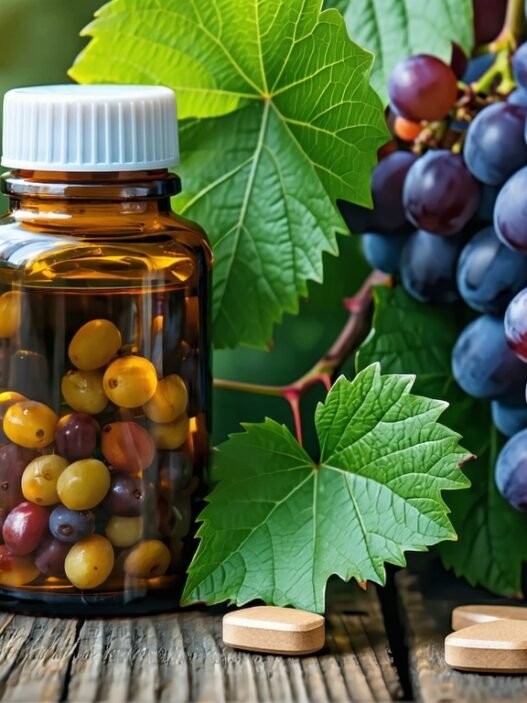Understanding Resveratrol
Resveratrol Basics
Resveratrol is a natural compound primarily found in the skins of grapes, berries, and certain nuts. It belongs to a group of compounds called polyphenols, known for their antioxidant properties. This substance is often associated with several health benefits, particularly in its potential to promote heart health and longevity. Research suggests that resveratrol can help reduce inflammation, lower LDL or “bad” cholesterol, and inhibit the formation of blood clots, which may reduce the risk of heart attacks.
| Source | Resveratrol Content (mg per 100g) |
|---|---|
| Red Grapes | 1-8 |
| Blueberries | 0.3-1 |
| Peanuts | 0.6-1 |
| Dark Chocolate | 0.1-0.7 |
The above table illustrates the varying levels of resveratrol found in different foods. For those seeking to incorporate more of this beneficial compound into their diet, foods rich in resveratrol provide a delicious and nutritious option. Those interested in supplementation can explore resveratrol supplements to help reach desired intake levels.
Role of Resveratrol in Aging
Resveratrol has garnered attention for its role in aging and longevity. One of its key mechanisms is the activation of the SIRT1 gene, believed to play a protective role against obesity and age-related diseases (WebMD). The activation of this gene may help enhance cellular metabolism and improve the body’s response to stressors, which can contribute to a longer, healthier life.
Moreover, studies indicate that resveratrol may help prevent insulin resistance, a condition that often precedes diabetes (WebMD). By enhancing insulin sensitivity, resveratrol may support metabolic health, further underscoring its potential role as an anti-aging compound.
In summary, resveratrol exhibits properties that may be beneficial for heart health and aging. By exploring its effects on inflammation, cholesterol levels, and insulin sensitivity, resveratrol benefits are becoming increasingly acknowledged within the health community. For those interested in combined effects, resveratrol’s impact on conditions related to aging invites further exploration into its therapeutic potential.
Health Benefits of Resveratrol
As more research surfaces regarding the potential health benefits of resveratrol, it becomes evident that this compound can play a significant role in promoting heart health, enhancing insulin sensitivity, and activating beneficial genes.
Impact on Heart Health
Resveratrol is thought to help reduce inflammation, lower LDL or “bad” cholesterol, and prevent clot formation, which can lead to heart attacks (WebMD). It has shown promise in the prevention and treatment of cardiovascular diseases (CVD) and heart failure (HF), major health concerns worldwide.
The beneficial effects of resveratrol on heart health can be highlighted in the following table:
| Heart Health Benefit | Mechanism |
|---|---|
| Reduced Inflammation | Decreases markers associated with inflammation. |
| Lower LDL Cholesterol | Improves lipid profiles. |
| Prevents Clots | Inhibits platelet aggregation to reduce clot formation. |
| Enhances Endothelial Function | Improves blood vessel function and health. |
Clinical trials indicate beneficial outcomes in lipid profiles, blood pressure, and endothelial function among individuals with conditions like dyslipidemia and ischemic heart disease.
Effects on Insulin Sensitivity
Resveratrol supports improved insulin sensitivity, which is crucial in preventing insulin resistance and type 2 diabetes. It achieves this by making the body more responsive to insulin, enhancing glucose regulation (WebMD). The following table outlines the effects of resveratrol on insulin sensitivity:
| Insulin Sensitivity | Effect |
|---|---|
| Improved Glucose Metabolism | Resveratrol enhances cellular response to insulin. |
| Reduced Risk of Type 2 Diabetes | Aids in preventing insulin resistance. |
This quality positions resveratrol as a potential ally for longevity and metabolic health, making it a popular choice among those interested in resveratrol for diabetes and overall longevity.
Activation of SIRT1 Gene
Resveratrol activates the SIRT1 gene, which plays an essential role in protecting against obesity and the diseases associated with aging. Studies have shown that SIRT1 activation can positively influence metabolism, stress resistance, and cellular repair mechanisms. The benefits of SIRT1 activation are summarized in the table below:
| SIRT1 Activation Benefit | Description |
|---|---|
| Metabolic Regulation | Helps control metabolic processes and maintain energy homeostasis. |
| Stress Resistance | Enhances cellular resilience against stressors. |
| Aging Protection | May contribute to longevity and reduce age-related decline. |
Resveratrol’s ability to enhance SIRT1 activity indicates its potential as a powerful compound in the pursuit of anti-aging solutions and health promotion. Those curious about the broader resveratrol benefits can explore its varied health impacts across different systems.
Resveratrol Sources and Dosage
Resveratrol is increasingly recognized for its potential health benefits, especially regarding heart health. Understanding the sources and appropriate dosages can help longevity and anti-aging enthusiasts incorporate this compound into their wellness routines effectively.
Natural Sources of Resveratrol
Resveratrol is found in over 70 plant species, but it is most prominently present in the skin and seeds of red grapes. This compound belongs to a group of polyphenols called stilbenoids, known for their antioxidant properties. Other natural sources of resveratrol include:
| Food Item | Resveratrol Content (mg) |
|---|---|
| Red Wine (1 glass) | 0.2 – 2.0 |
| Concord Grapes (1 cup) | 0.1 – 0.5 |
| Blueberries (1 cup) | 0.03 – 0.1 |
| Peanuts (1 ounce) | 0.01 – 0.03 |
| Dark Chocolate (1 ounce) | 0.02 – 0.05 |
While it can be obtained from these foods, achieving therapeutic levels solely through diet may be challenging. For those seeking higher concentrations, resveratrol supplements are available.
Recommended Dosages
The optimal dosage of resveratrol can vary depending on individual health goals and sources of intake. Research suggests the following general guidelines:
- General Health: 100-500 mg per day
- Heart Health Benefits: 250-500 mg per day
- Specific Conditions: Doses can vary significantly based on individual needs and should be discussed with a healthcare provider.
Despite its beneficial properties, it’s important to note that resveratrol has poor bioavailability when taken orally. Enhanced formulations or specific delivery methods in supplements may help improve absorption. To determine the most suitable dosage for personal health, consulting with a healthcare professional is advised. This approach not only promotes safety but also aligns with individual health goals, particularly those related to heart wellness, such as reducing oxidized LDL levels and other cardiovascular risk factors (PubMed Central).
Side Effects and Considerations
Understanding the safety and potential side effects of resveratrol is crucial for those considering its use for health benefits, especially for heart health.
Safety of Resveratrol
Research indicates that resveratrol is generally safe even in larger doses, with clinical trials reporting no severe side effects. However, individuals allergic to grapes or wine may experience allergic reactions. Those with bleeding disorders should consult a healthcare provider before starting resveratrol supplements, as the compound can affect blood clotting (WebMD).
| Dosage Level | Safety Status |
|---|---|
| Up to 2.5 grams | Generally well-tolerated |
| 2.5 – 5 grams | Potential for abdominal side effects like cramping, flatulence, and nausea |
Potential Allergic Reactions
While serious side effects are rare, allergic reactions can occur, especially in those sensitive to compounds prevalent in grapes. Symptoms may include skin rashes, itching, or digestive disturbances. Individuals with known allergies should approach resveratrol with caution.
Dosage Considerations
Determining the appropriate dosage of resveratrol can be challenging. Clinical trials suggest it is safe to take up to 5 grams per day, but doses exceeding 2.5 grams daily may lead to gastrointestinal issues. More research is needed to establish a clear guideline for effective dosing in humans (Medical News Today).
When considering resveratrol for health benefits, including heart health, it is vital to be mindful of potential interactions with other medications. High doses can interfere with enzyme activity, increasing the toxicity of certain drugs, particularly anticoagulants and nonsteroidal anti-inflammatory drugs.
Engaging with a healthcare provider to discuss personal health conditions and potential drug interactions can help ensure a safe supplement experience. For more details on dosage specifics, refer to the article on resveratrol dosage.
Research Studies on Resveratrol
Research continues to uncover the potential benefits of resveratrol for cardiovascular health, diabetes management, and cognitive function. These findings are particularly significant for longevity and anti-aging enthusiasts.
Effects on Cardiovascular Health
Numerous studies have indicated that resveratrol may support heart health. Resveratrol supplementation has been associated with improved flow-mediated dilatation in overweight or obese individuals with mildly elevated blood pressure. Additionally, resveratrol has shown the ability to decrease both oxidized LDL levels and apolipoprotein B-100 plasma levels, making it a valuable supplement in the primary prevention of cardiovascular disease (PubMed Central).
A landmark study demonstrated that participants with coronary artery disease improved their left ventricle diastolic function after taking resveratrol at a dose of 10 mg per day for three months (PubMed Central).
| Study Type | Findings |
|---|---|
| Flow-mediated dilatation | Improved in overweight/obese individuals with high blood pressure |
| LDL and Apolipoprotein B-100 | Decreased plasma levels in cardiovascular patients |
| Diastolic Function | Improved in coronary artery disease patients with daily dosing |
Impact on Diabetes Management
Resveratrol has also been researched for its potential protective effects in diabetes management. Clinical trials have reported beneficial effects on insulin resistance, hyperinsulinemia, and hyperglycemia among participants with diabetes. This research highlights resveratrol’s role in improving diabetes-related complications, supporting the idea that it might help in managing this condition efficiently.
| Study Type | Findings |
|---|---|
| Clinical Trials | Show protective effects on insulin resistance and hyperglycemia |
| Hepatic Steatosis | Positive outcomes in cardiovascular indices in type 2 diabetes patients |
Cognitive Function and Anti-aging
Cognitive health has been linked to resveratrol as well. A pilot study demonstrated that 90 days of resveratrol supplementation positively affected cognitive function in older adults. Resveratrol is believed to activate the SIRT1 gene, which is thought to help protect against age-related diseases (WebMD). This adds to the compound’s appeal for those focused on longevity and anti-aging.
| Study Type | Findings |
|---|---|
| Pilot Study | Cognitive function improved in elders after 90 days of supplementation |
| SIRT1 Activation | Believed to protect against aging-related effects |
These studies suggest that resveratrol could be impactful for heart health, diabetes management, and cognitive function, offering promising avenues for supporting health and longevity. For more information on general resveratrol benefits, available resveratrol supplements, and related health topics, please explore the various resources linked throughout the article.
Resveratrol and Disease Prevention
Resveratrol is increasingly recognized for its potential role in disease prevention, particularly in relation to metabolic syndrome and other health conditions.
Role in Metabolic Syndrome
Metabolic syndrome is a cluster of conditions that increase the risk of heart disease, stroke, and diabetes. Resveratrol has been studied for its potential to address several components of this syndrome. One randomized controlled trial indicated that resveratrol supplementation may improve flow-mediated dilatation in overweight or obese individuals with mildly elevated blood pressure, a key indicator of cardiovascular health. This suggests that resveratrol could play a beneficial role in managing blood pressure and overall cardiovascular function.
Therapeutic Potential for Various Conditions
Resveratrol’s therapeutic potential extends beyond metabolic syndrome and heart health. Research indicates that this compound may have a mild effect on renal function in the general adult population (Nutrition Research). Moreover, it has been tested for benefits pertaining to type 2 diabetes. However, results have not been consistently positive, with some studies showing no measurable effects of resveratrol on diabetic patients after six months of supplementation.
Resveratrol is also being explored for its potential anti-inflammatory properties, which could mitigate various chronic conditions. Its antioxidant capabilities further enhance its role in promoting cardiovascular health and potentially preventing conditions linked to oxidative stress.
Challenges and Future Research
Despite the promising findings regarding resveratrol, challenges remain in fully understanding its effects and applications. The variability in individual responses to supplementation indicates that further research is necessary to establish standard dosages and treatment regimens. Previous studies have shown positive effects in some populations while others have not demonstrated significant benefits, signifying the need for larger, more comprehensive clinical trials.
Future research should focus on the long-term effects of resveratrol supplementation, its interactions with other nutrients, and the influence of dietary sources of resveratrol. Understanding these variables will be key to harnessing its full potential for disease prevention and promoting overall health. To learn more about different types of resveratrol, explore our articles on resveratrol foods and resveratrol supplements.





















